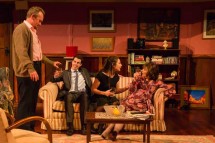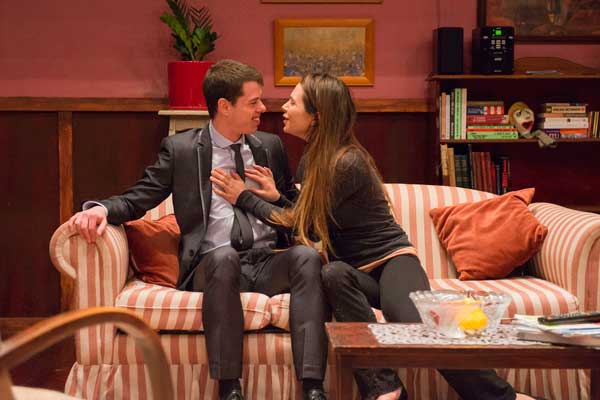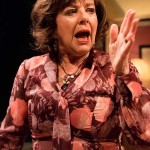Who’s Afraid of Virginia Woolf?

(Dir. Geoff Brittain) Adelaide University Theatre Guild, 15 August 2015
This ivy-league Greek tragedy, a superb three-act melodrama by Edward Albee, was filmed in 1966 by Mike Nicholls, using camera-men suspended from ropes to achieve the claustrophobic intimacy the piece requires.
The action occurs in the sprawling living room of George and Martha, a New England University history professor and his wife, the daughter of the Vice Chancellor. A Saturday evening faculty party has been in swing and Martha wants to party on, inviting newbies Nick and Honey back to their house. As the night unfolds, Mario-Lanza-amounts of liquor take effect, tempers flare, and secrets are revealed in spectacular and devastating fashion.
In this Theatre Guild production, there’s some minor tweaking: the Chicago film reference is updated to the Catherine Zeta-Jones version [note to movie buffs; the film Martha has in mind is Beyond the Forest, 1949, Warner Bros.] and 3 acts are neatly compressed into two, with some of the dialogue cut, but essentially it plays as written; in other words, like a dream. Harold Hobson in the Sunday Times appraised the piece as having “an intensity, a demoniac misery, a ferocious humour…no one can remain indifferent to its power, its resilience of ideas and its range of language.”
Albee’s most famous play is vivid, verbose, and vehemently personal. The performances are critical. Any weak link can undermine the whole chain. Apart from a tendency to let the Boston (and Kansas) accents come and go, in this production all four actors are a revelation. Mark Healy is terrific as the opportunistic Nick, smug, petulant, and on the make, awfully slow to realise how out of his depth he is. No one could erase the memory of Sandy Dennis’ staggering film performance as the brandy-soaked, slim-hipped, nerve-storm that is Honey, but Jessica Carroll manages to convey Honey’s profound sadness with a superb, un-showy rendition.
George is the anchor role and Chris Leech grounds him in a fine, knowing, stoical manner, cleverly balancing his sense of waste and failure with burgeoning reserves of determination. The pyrotechnical character of Martha is brilliantly realised by Julie Quick and the overall effect is to revivify the play without overcooking it, as the film version tends to do. In sum, the performances are magnificent.
The play’s conclusion, after such an excoriating catharsis, is quiet, yet intense, and hangs by a delicate thread. If it is not handled just right, it can be mawkish and unconvincing. Here, it is beautifully done, managing to be moving and true. All in all, this is what an evening at the theatre should be. Why are mainstream Theatre Companies putting on heavily subsidised trash, when the SA Theatre Guild, on a relative shoestring, can put on a classic, and hit it for six?
Liz would have liked Ms Quick’s performance:
Leave a comment...
While your email address is required to post a comment, it will NOT be published.





1 Comment